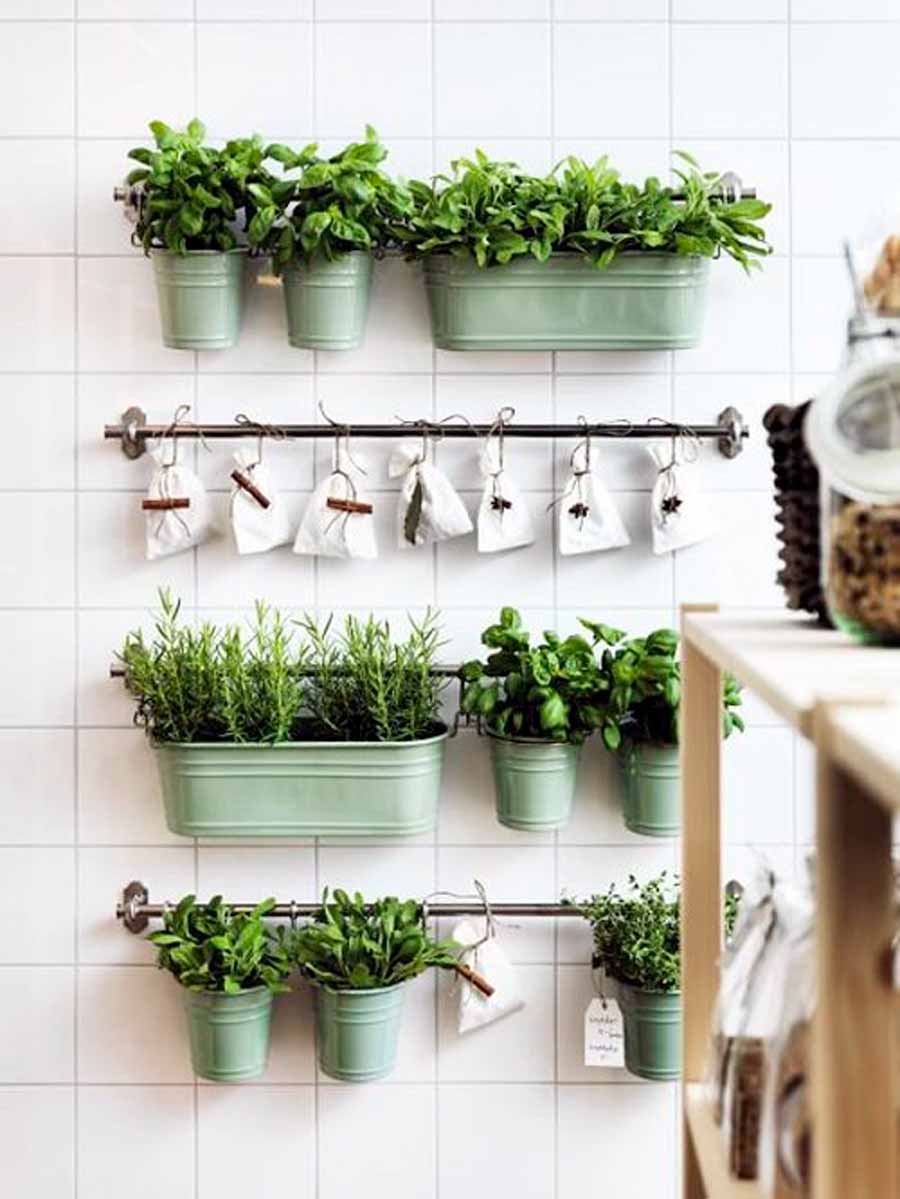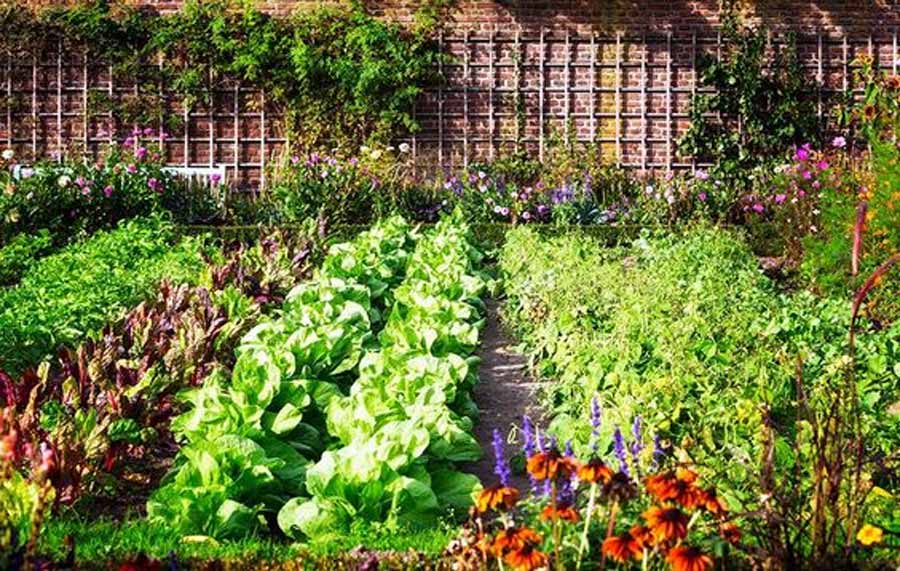Kitchen Gardening
You open your eyes to a fresh day, only to close them again, the ordinary aspects of your life forces you to do so. But then you remember your kitchen garden and your eyes widen with a smile on your face. Nature has the ability to make us feel warm and cozy inside. Your kitchen garden is a part of your home that gets you connected to nature.
To cultivate a bountiful garden, you don’t need to live in a house with lots of space, or be a farmer with knowledge, resources and acres of land, or an expert ingrowing, vegetables and fruits. Your kitchen garden can be a place for nature to provide her bounties in your surroundings, especially for urban dwellers. More excitingly it will be a place to be adventurous and experiment with variety of crops.
Also Read:
- Kitchen Gardening Ideas & Tips
- Onions: A Must Have During Summer
- To Plant a Garden is To Believe in Tomorrow
Table of Contents
A kitchen garden or potager

A kitchen garden is usually smaller,
aesthetically more pleasing and could be quickly accessed by the cook. It blends with how the entire house looks in terms of design. The production or yield of the garden is meant for fresh consumption and not for sale. If you are fortunate to have a great yield it will be wonderful to share the produce with your neighbours, friends and relatives. It is popular wisdom amongst members in a family to encourage each other to eat their greens for various health benefits.
That is the way to health and if we grow our own greens, we can experience health and happiness. Whenever you take up any creative activity you are bound to be happy, gardening included. Kitchen Gardening adds a different kind of excitement and spice to one’s life. Our elders laid much emphasis on the importance of garden produce for good diet, well before doctors started advising us about vitamins, minerals and fiber.
Growing your salads using herbs and leafy vegetables, making paranthas from fenugreek(methi) from your kitchen garden, and the occasional tomatoes,cucumber, lettuce picked minutes before eating will make the table quiet appetising. You will be delighted by the process,witnessing the ways of nature right before your eyes. None can match nature in wrapping, preserving and presenting food. Another important advantage would be to relish fresh produce that are free from chemicals, toxic fertilizers, insecticide, fungicide or weed killer.
Now that an interest has sparked in you about kitchen gardens, let us understand the important steps and points to be kept in mind.
 Selection of place –
Selection of place –
The site you will grow vegetables should receive plenty of sun. Each plant is a mini factory that converts solar energy into nutrition. Your kitchen garden needn’t necessarily be in the kitchen. It can be out in the small balcony, or on a window grill or even in the living room.
Choose your pots–
You can either grow on a flat ground or raised beds. You can grow edible plants in almost any container. You could use old bottles, buckets, used tyres or buy pretty looking metallic, ceramic or wooden pots. Choose as per your interest and most importantly as per the space that you have chosen for your kitchen garden.
Don’t let the lack of space deter your enthusiasm to grow your food. Consider installing wall planters, railing planters, and even hanging baskets to support crops that grow vertically.
Right Soil –
Once you figured out the sunny spot and decided on your pots and plants the next is spend some time on finding the right soil. You can find nurseries selling ready-made potting mix. Make sure the soil is allowing the water to seep through and not holding it in, as too much water can rot the roots. Keep a pack of organic fertilizer, which you can add in to your kitchen garden site to recharge the soil every month or so. Explore ways to make your own compost from kitchen waste.
Start Simple –
If you are new to Kitchen Gardening it is best to start with easy-to-grow herbs and vegetables like mint, basil, coriander, tomatoes, cucumbers, beans etc.
Carefully choose what to grow –
You may like fresh mint for your drinks and tea or Italian basil for homemade pesto, beans, ladyfinger, brinjal and tomatoes for delicious dishes, lettuce and spinach for salads. Choose what you would like to grow but stick to just one or two items to begin with.
Space out your vegetables well –
Attention to be given in arranging your crops. Spacing out well is the key to get a good yield. Planting in rows or square pattern is common but you can try to plant in a triangular pattern. Ensure that you do not cram up your planting beds.
Transplantation –
You can transplant mature seedlings on the soil instead of sowing seeds. Since the transplants are a couple of weeks old when you plant them, they will be healthier and adapt faster than the direct-seeded plants. E.g. take a thick green mint stem without roots. Remove the leaves from the bottom of the stem and place it in a bottle of water allowing it enough sunlight. Change the water in 2/3 days. In about two weeks you will see roots appearing in the stem. You can take this stem and transplant it in a fresh pot with soil.
Tools –
It will be nice to have few tools to tend your garden. It may be a trowel, a spade, shovel and a garden scissor or as per your convenience.
When you have taken care of the above points it is important that you put some time aside for your garden. Time is the most important element. Even a small garden needs regular tending and watering the plants. During the cooler parts of the day it would do a lot good if you could spend time with the plants in your kitchen garden. You need not have a schedule time, the more time you spend in your garden the more you learn about your plant’s requirements. They start talking to you and you can reciprocate. They are making efforts to share with you their gifts in the form of vegetables, herbs and fruits.
Once you start growing vegetables, you will understand the miracle of nature that you have been missing out on. You will realize how little we know about our daily food. Occasionally you may encounter some challenge which you can resolve with the help of Google, or connecting to your local gardening group/s or even consult your nearby nursery. The more you grow the more you will learn. Soon you will become the source of seeds and saplings for other enthusiasts around you. You may just initiate an interest and encourage others in your environment to grow their own herbs, vegetable and fruits as well.





























 Selection of place –
Selection of place –















